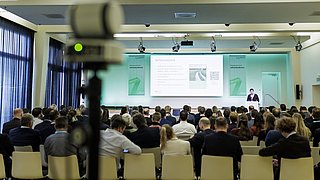Biogaspartner annual conference 2022

Session I: Bioenergy Between Public Acceptance and Climate Protection Contribution
In the first block of the conference, Nils Freiberg (BMWK) presented the German government's National Biomass Strategy, which aims to establish a comprehensive approach to the sustainable production and use of biomass. A draft proposal is expected by the end of 2023 after incorporating input from various stakeholders and completing multiple process stages. The strategy is intended to go beyond theoretical concepts and include specific, actionable measures.
During the discussion with Dr. Peter Kornatz (German Biomass Research Center) and Sandra Rostek (German Renewable Energy Federation), Mr. Freiberg emphasized that biomass will continue to play a crucial role in achieving climate protection goals. Biomass must be utilized where it achieves the highest climate benefits. Ms. Rostek expressed hope that the strategy would be holistic and sufficiently address the diverse areas of biomass utilization, providing planning security for plant operators. Dr. Kornatz stressed the importance of not banning cultivated biomass in the strategy. Mr. Freiberg called for an open dialogue and invited stakeholders to submit written statements to the BMWK.
Session II: The Role of Biomethane in Transport During the Energy Crisis
Johannes Daum (NOW) highlighted the high energy prices, limited energy availability, and insufficient infrastructure, which make achieving climate protection goals challenging. However, biomethane as a fuel has remained relatively stable in price. In the future, renewable methane should be prioritized for trucks and maritime applications.
Uwe Brinks (DHL) emphasized the importance of technological openness for renewable fuels. He sees CNG as a good medium-term solution, particularly in local transport due to the existing refueling infrastructure, pricing, and CO2 balance. In the long term, he sees the most potential in battery-electric drives and (bio-)LNG.
Dr. Henrik Bramlage (avanca) outlined synergy opportunities in the supply of LNG fuels for heavy-duty transport. The REEFUELERY, set to become operational in Q4 2023, will produce 180 tons of bio-LNG daily, enabling the climate-neutral operation of 4,500 heavy-duty vehicles.
Norman Wendt (en2x) pointed out the significant uncertainties in the demand for alternative fuels, depending on the adoption rate of e-mobility. While the vehicle fleet grows by approximately 300,000 vehicles annually, e-mobility alone cannot cover this demand. Therefore, advanced fuels remain necessary to replace fossil fuels.
Session III: Biomethane Between Rising Demand and Supply-Side Constraints
Dr. Frank Scholwin (Institute for Biogas, Circular Economy & Energy) identified several challenges for the development of new biomethane plants, including lengthy planning processes, supply chain delays, fluctuating policy frameworks, rising costs, and investment uncertainties. Despite these hurdles, many investors are willing to fund new biomethane projects.
Isolde Pless (Federal Office for Agriculture and Food) provided an update on the implementation of the Biomass Electricity Sustainability Ordinance in the Nabisy system. Due to a late system update, it was exceptionally possible to enter sustainability certificates for electricity from solid and gaseous biomass for Q1–Q3 2022 until November 30, 2022. However, due to high demand, the timely issuance of all requested certificates remains a challenge.
Nico Blume (Danpower) stressed the importance of biomethane in achieving Germany’s renewable heat targets. Highly flexible CHP plants can use biomethane to meet seasonal heat demand, though the role of heat storage solutions is becoming increasingly critical.
Presentations from the biogaspartner annual conference
- Aktuelle und zukünftige Entwicklungen alternativer Antriebe im Nutzfahrzeugbereich Johannes Daum 2.31 MB pdf
- Einsatz von Bio-CNG aus Sicht eines Spediteurs Uwe Brinks 2.30 MB pdf
- Ausbau, Preisgestaltung und Hochlauf von Bio-LNG sowie Update zum Bau der REEFUELERY Dr. Henrik Bramlage 1.54 MB pdf
- Aktuelle Herausforderungen im Quotenhandel aus Sicht eines Inverkehrbringers Norman Wendt 893.03 KB pdf
- Herausforderungen und Lösungen aus der Praxis der Realisierung von Neuanlagen sowie Konversion von Stromerzeugung zur Biogaseinspeisung Dr. Frank Scholwin 2.68 MB pdf
- Stand der Umsetzung der Biomassestromnachhaltigkeits- verordnung im Falle von Biomethan im Nabisy Isolde Pless 2.27 MB pdf
- Potenziale hochflexibler KWK-Anlagen mit Biomethan Nico Blume 4.20 MB pdf